
Tool to help apply the population-focused nursing process used in community health nursing.
- Subject:
- Nursing
- Material Type:
- Activity/Lab
- Author:
- Christy Gipson
- Date Added:
- 01/04/2022

Tool to help apply the population-focused nursing process used in community health nursing.
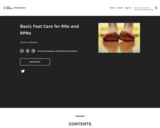
After completing this unit, the student will be able to discuss the historical perspective of foot care, identify the role of the Registered Nurse and Registered Practical Nurse in foot care, recognize the limitations beyond the scope of practice of foot care for Registered Nurses and Registered Practical Nurses and make appropriate referral, and identify other providers of foot care and their scope of practice.
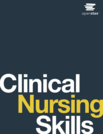
Clinical Nursing Skills is designed to equip nursing students with the practical knowledge and hands-on skills necessary to provide comprehensive patient care. The material emphasizes the application of clinical judgment in a variety of settings, ensuring that students are prepared to deliver high-quality care across different patient populations and clinical scenarios. The content utilizes concepts promoting the development of clinical judgment by building upon the systematic model developed by the National Council of State Boards of Nursing (NCSBN).
Clinical Nursing Skills provides detailed instructions on basic procedures such as hygiene, mobility, vital signs assessment, medication administration, and wound care. It also guides students through more complex skills, including intravenous therapy, catheterization, tracheostomy care, and emergency interventions. By integrating the Clinical Judgment Measurement Model, the material helps students recognize, analyze, prioritize, create, act, and evaluate outcomes in various clinical situations, fostering critical thinking and clinical decision making. By studying Clinical Nursing Skills, students will gain the confidence and competence needed to perform essential nursing tasks, make informed clinical decisions, and provide compassionate, patient-centered care, which will prepare students for success in their clinical rotations and future professional practice.
Senior Contributing Authors
Christy Bowen, Chamberlain University
Contributing Authors
Taranee Albert, Northwestern Medicine
Mary Anne Bera
Jessica Crockett, Baptist Health Care
Lindsay L. Draper, University of North Carolina Greensboro
Sandy Grimm, Nurse Educate
Alissa Hershberger, University of Central Missouri
Stephanie Hoffman, Chamberlain University
Czarina Hounsel, University of Texas at Arlington
Lindsay Jusino, The University of West Florida
Lori Kelly, Lipscomb University
Heather Moore, Xavier University
Amisha Parekh de Campos, University of Connecticut
Margaret Riley, Nurse Educate
Susan M. Rouse (Retired)
Leigh A. Waldron, Western Governors University
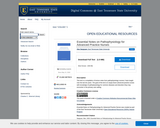
This text is a compilation of lecture notes from pathophysiology courses I have taught over the last ten years. The goal of the text is to equip future advanced practice nurses with knowledge of pathophysiology for common diseases and disorders they may encounter in the primary care setting.

Fundamentals of Nursing aligns with the outcomes and competencies of a nursing fundamentals course. It is designed to provide students with the foundational knowledge and practical expertise essential for delivering holistic and patient-centered care. The authors emphasize the application of clinical judgment across diverse healthcare environments, ensuring readiness to deliver high-quality, compassionate care in an inclusive and supportive manner. Composed of 43 chapters, Fundamentals of Nursing offers an in-depth exploration of the roles and responsibilities of the nursing profession, the healthcare environment, and the application of critical thinking and evidence-based practice.
Fundamentals of Nursing features a variety of engaging and informative resources designed to prepare students for real-world clinical environments. By simulating patient interactions, students develop critical communication skills essential for effective nursing care. Insights from practicing nurses provide real-world perspectives, helping bridge the gap between theory and practice. The offering builds student confidence and competence through its focus on Quality and Safety Education for Nurses (QSEN), inclusion of robust unfolding case studies, and integration of NCLEX practice.
Senior Contributing Authors
Christy Bowen, Chamberlain University
Lindsay Draper, University of North Carolina at Greensboro
Heather Moore, Xavier University
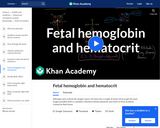
Although mom controls the oxygen source, the fetus has a couple of clever tricks to get the most oxygen possible! Rishi is a pediatric infectious disease physician and works at Khan Academy.

Learn how the needs of the fetus are met by the placenta, which is a special organ that belongs to both the mother and the fetus! Rishi is a pediatric infectious disease physician and works at Khan Academy.
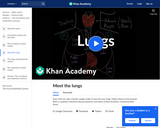
Every time you take a breath, oxygen makes it way into your lungs. Follow along on that journey! Rishi is a pediatric infectious disease physician and works at Khan Academy.
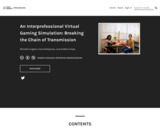
This virtual simulation promotes the application of knowledge and skills related to interprofessional collaboration and infection prevention and control practices. Learners will need a foundational knowledge in infection prevention and control practices, including routine practices and additional precautions guidelines. Learners will use their assessment and communication skills throughout the game. By the end of the virtual gaming simulation, learners will be able to apply interprofessional communication skills to foster collaboration and provide safe client care, demonstrate knowledge and skills related to infection prevention and control practices, and identify high risk areas to break the chain of transmission.
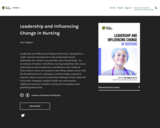
Leadership and Influencing Change in Nursing is designed for a single-semester introduction to the professional nurse’s leadership role as both a care provider and a formal leader. An assortment of authors with diverse nursing leadership roles across Saskatchewan and Canada have contributed to this textbook. These diverse voices are focused on providing student nurses with the foundational tools, techniques, and knowledge required to empower them to meet the leadership challenges found within the incessantly changing Canadian health care environment.
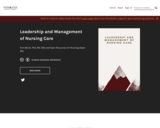
This is an open educational resource with CC-BY licensing. It has been developed specifically for pre-licensure nursing students preparing to graduate and take the NCLEX-RN to obtain their nursing license. It is a remixed version of the Nursing Management and Professional Concepts OER and the content has been updated based on the Texas State University St. David’s School of Nursing nursing curriculum Leadership and Management of Nursing Care course (NURS 4351), the 2019 NCLEX-RN Test Plan, and the Texas Nurse Practice Act.
This book introduces concepts related to nursing leadership and management, prioritization strategies, delegation and supervision, legal implications of nursing practice, ethical nursing practice, collaboration within the interprofessional team, health care economics, quality and evidence-based practice, advocacy, preparation for the RN role, and the avoidance of burnout with self-care. Several online, interactive learning activities are included in each chapter that encourage application of content to patient care situations.
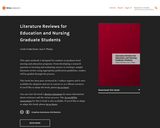
Literature Reviews for Education and Nursing Graduate Students is an open textbook designed for students in graduate-level nursing and education programs. Its intent is to recognize the significant role the literature review plays in the research process and to prepare students for the work that goes into writing one. Developed for new graduate students and novice researchers just entering into the work of a chosen discipline, each of the eight chapters covers a component of the literature review process. Students will learn how to form a research question, search existing literature, synthesize results and write the review. The book contains examples, checklists, supplementary materials, and additional resources. Literature Reviews for Education and Nursing Graduate Students is written by two librarians with expertise guiding students through research and writing assignments, and is openly licensed.
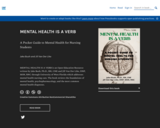
A Pocket Guide to Mental Health for Nursing Students
Short Description:
MENTAL HEALTH IS A VERB is an Open Education Resource written by Jake Bush, Ph.D., RN, CNE and Jill Van Der Like, DNP, MSN, RNC through University of West Florida which addresses mental health nursing care. The book reviews the foundations of mental health, psychopharmacology, and the most common mental health diagnoses.
Long Description:
MENTAL HEALTH IS A VERB is an Open Education Resource written by Jake Bush, Ph.D., RN, CNE and Jill Van Der Like, DNP, MSN, RNC through University of West Florida which addresses mental health nursing care. The book opens with a foundational module, that provides a brief history of mental health treatment, pertinent theorists, and the underpinning concepts of mental health versus mental illness, followed by a separate chapter on psychopharmacology. The heart of the text is arranged into the most common mental health diagnoses.
Word Count: 35508
(Note: This resource's metadata has been created automatically by reformatting and/or combining the information that the author initially provided as part of a bulk import process.)

Medical-Surgical Nursing is a comprehensive and engaging resource for nursing students, equipping them with the essential knowledge and skills required to provide high-quality care. Building on the foundational knowledge and skills acquired in previous nursing courses, this textbook expands students’ learning with concepts in medical-surgical nursing. The offering provides the background to ensure that nursing students are well-versed in both the science and art of nursing, capable of critical thinking, clinical judgment, and compassionate care.
Medical-Surgical Nursing encompasses a broad range of patient-care situations, from managing chronic conditions to providing postoperative care. The material includes concise explanations to facilitate understanding, as well as rich reviews of pathophysiology, ensuring students grasp essential concepts without becoming overwhelmed. Beyond theoretical knowledge, the text emphasizes the development of practical skills and competencies, and incorporates evidence-based best practices into each of its 38 chapters.
Senior Contributing Authors
Christy Bowen, Chamberlain University
Bridget Carey, Holy Family University
Jessica Palozie, University of Connecticut
Maren Reinholdt, University of Rochester School of Nursing
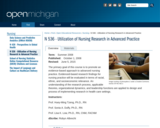
The primary goal of this course is to promote an evidence-based approach to advanced nursing practice. Evidenced-based research findings for nursing practice will be evaluated in terms of racial, ethnic, and socioeconomic relevance. An understanding of the research process, applicable theories, organizational dynamics, and leadership functions are applied to design and process of implementing research in health care settings.
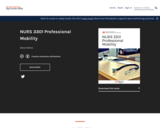
This is a companion book to the NURS 3301 course covering Professional Mobility.
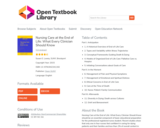
Nursing Care at the End of Life: What Every Clinician Should Know should be an essential component of basic educational preparation for the professional registered nurse student. Recent studies show that only one in four nurses feel confident in caring for dying patients and their families and less than 2% of overall content in nursing textbooks is related to end-of-life care, despite the tremendous growth in palliative and end-of-life care programs across the country. The purpose of this textbook is to provide an indepth look at death and dying in this country, including the vital role of the nurse in assisting patients and families along the journey towards the end of life. There is an emphasis throughout the book on the simple, yet understated value of effective interpersonal communication between the patient and clinician. The text provides a basic foundation of understanding death and dying, including a brief historical examination of some main conceptual models associated with how patients cope with impending loss. An overview of illness trajectories and models of care, such as hospice and palliative care are discussed. Lastly, the latest evidence-based approaches for pain and symptom management, ethical concerns, cultural considerations, care at the time of death, and grief/bereavement are examined. The goal of this text is to foster the necessary skills for nurses to provide compassionate care to individuals who are nearing the end of life and their families. Every chapter contains a “What You Should Know” section which highlights and reinforces foundational concepts.
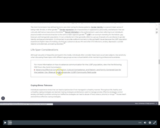
This Nursing Fundamentals textbook is an open educational resource with CC-BY licensing developed for entry-level nursing students. Content is based on the Wisconsin Technical College System (WTCS) statewide nursing curriculum for the Nursing Fundamentals course (543-101), the 2019 NCLEX-RN Test Plan,[1] the 2020 NCLEX-PN Test Plan,[2] and the Wisconsin Nurse Practice Act.[3]
This book introduces the entry-level nursing student to the scope of nursing practice, various communication techniques, and caring for diverse patients. The nursing process is used as a framework for providing patient care based on the following nursing concepts: safety, oxygenation, comfort, spiritual well-being, grief and loss, sleep and rest, mobility, nutrition, fluid and electrolyte imbalance, and elimination. Care for patients with integumentary disorders and cognitive or sensory impairments is also discussed. Learning activities have been incorporated into each chapter to encourage students to use critical thinking while applying content to patient care situations.
The Open Resources for Nursing (Open RN) project is supported by a $2.5 million grant from the Department of Education. This book is available for free online and can also be downloaded in multiple formats for offline use. The online version is required for interaction with adaptive learning activities included in each chapter. Affordable print versions may also be purchased from XanEdu in college bookstores and on Amazon.
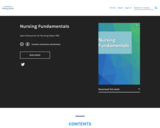
This Nursing Fundamentals textbook is an open educational resource developed for entry-level nursing students.
This book introduces the entry-level nursing student to the scope of nursing practice, various communication techniques, and caring for diverse patients. The nursing process is used as a framework for providing patient care based on the following nursing concepts: safety, oxygenation, comfort, spiritual well-being, grief and loss, sleep and rest, mobility, nutrition, fluid and electrolyte imbalance, and elimination. Care for patients with integumentary disorders and cognitive or sensory impairments is also discussed.
Learning activities have been incorporated into each chapter to encourage students to use critical thinking while applying content to patient care situations.
Content is based on the Wisconsin Technical College System (WTCS) statewide nursing curriculum for the Nursing Fundamentals course (543-101), the 2019 NCLEX-RN Test Plan,[1] the 2020 NCLEX-PN Test Plan,[2] and the Wisconsin Nurse Practice Act.[3]
The project is supported by a $2.5 million Open Resources for Nursing (Open RN) grant from the Department of Education and is licensed under a Creative Commons Attribution 4.0 International License.
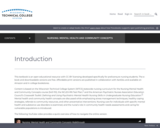
Overview: This textbook is an open educational resource with CC-BY licensing developed specifically for prelicensure nursing students. The e-book and downloadable versions are free. Affordable print versions are published in collaboration with XanEdu and available on Amazon and in college bookstores.
Content is based on the Wisconsin Technical College System (WTCS) statewide nursing curriculum for the Nursing Mental Health and Community Concepts course (543-110), the NCLEX-RN Test Plan, 1 and the American Psychiatric Nurses Association Education Council’s Crosswalk Toolkit: Defining and Using Psychiatric-Mental Health Nursing Skills in Undergraduate Nursing Education. 2 Mental health and community health concepts are discussed while emphasizing stress management techniques, healthy coping strategies, referrals to community resources, and other preventative interventions. Nursing care for individuals with specific mental health and substance use disorders is examined, and the nurse’s role in community health needs assessments and caring for vulnerable populations is introduced.
The e-book is free and can be viewed online or downloaded as a PDF or other formats for offline use. Affordable print versions are also published in collaboration with XanEdu and are available on Amazon and in college bookstores.